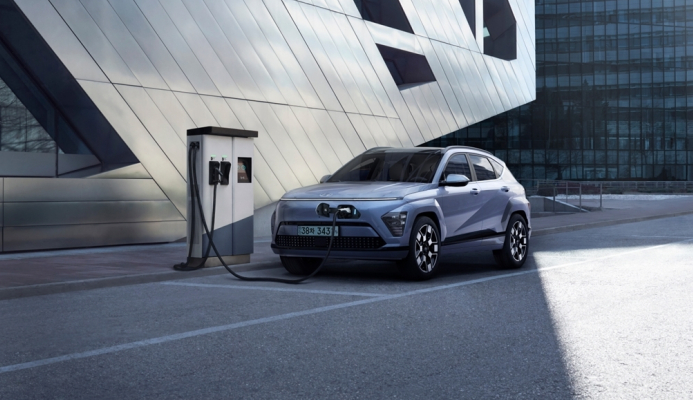Automobiles
Hyundai's Kona Electric nears 300,000 in cumulative sales
285,138 units sells by April since its launch in 2018, New 2nd generation Kona will release in overseas market
By Jun 12, 2023 (Gmt+09:00)
2
Min read
Most Read
LG Chem to sell water filter business to Glenwood PE for $692 million


Kyobo Life poised to buy Japan’s SBI Group-owned savings bank


KT&G eyes overseas M&A after rejecting activist fund's offer


StockX in merger talks with Naver’s online reseller Kream


Mirae Asset to be named Korea Post’s core real estate fund operator



Kona Electric, the best-selling Korean electric vehicle (EV) of Hyundai Motor Co.'s compact sports utility vehicle (SUV), is on the verge of reaching a cumulative sales volume of 300,000 units.
According to the company's investor relations data on Monday, the global cumulative sales of Kona Electric from its launch in 2018 until April of this year amounted to 285,138 units.
The sales figures for Kona Electric demonstrate a steady growth trajectory. In 2018, annual sales stood at 22,787 units, which increased to 85,313 units in 2020. However, due to a severe semiconductor shortage, sales dropped to 45,610 units in 2021.
Sales bounced back to 56,611 units in the following year. By April this year, 26,366 units had already been sold. Based on this upward trend, it is likely that sales will surpass 300,000 units by next month.
Hyundai has placed significant emphasis on the Kona model lineup, which includes internal combustion engines, hybrids, and electric vehicles. This strategic focus was announced by Hyundai Motor Group's Chairman, Chung Euisun, in 2017 when he was vice-chairman of the company.
Kona Electric has played a vital role in penetrating major global electric vehicle markets until the introduction of Hyundai Motor Group's IONIQ 5, the company's first model based on the exclusive E-GMP (electric global modular platform) for electric vehicles.
Out of the total cumulative sales of Kona Electric, overseas sales accounted for a substantial portion of 258,663 units, which is seven times more than the number of domestic sales (34,275 units). In the past year alone, over 50,000 units were sold internationally. Kona Electric is manufactured not only in Korea but also in foreign factories, such as the one in the Czech Republic.
Kona Electric has also outperformed other domestic electric vehicles in terms of cumulative sales, surpassing the Kia Niro EV (228,894 units), Hyundai IONIQ 5 (203,515 units), and Kia EV6 (149,129 units).
In January, Hyundai unveiled the second generation of Kona, marking five years since its debut. The new Kona Electric, designed primarily as an electric vehicle before adapting to combustion engine models, has generated high expectations. Additionally, the model's driving range on a single charge has increased to 417 km compared to the first generation's 406 km, showcasing Hyundai's latest technological advancements.
The new Kona Electric is scheduled to be launched in the European and American markets in the second half of this year, where the first-generation Kona received a warm reception.
There is significant interest in whether the new Kona Electric will contribute to Hyundai's re-entry into the Japanese market, which began last year.
Hyundai has already introduced the IONIQ 5 and Nexo in Japan, with the former being named Japan's Import Car of the Year at the end of last year. The Nexo is also gaining recognition as a leading hydrogen vehicle. It remains to be seen if Kona Electric can leverage the popularity of compact SUVs to meet the demand in the Japanese market.
Write to Il-Gue Kim at black0419@hankyung.com
More to Read
-
 AutomobilesHyundai launches second-generation Kona EV, 417km on a single charge
AutomobilesHyundai launches second-generation Kona EV, 417km on a single chargeApr 13, 2023 (Gmt+09:00)
1 Min read -
 Electric vehiclesHyundai eyes greater SUV market share with new Kona EV
Electric vehiclesHyundai eyes greater SUV market share with new Kona EVMar 07, 2023 (Gmt+09:00)
2 Min read -

-
 Electric vehiclesAward-winning Hyundai IONIQ 5 EV to land in Japan as MK Taxi
Electric vehiclesAward-winning Hyundai IONIQ 5 EV to land in Japan as MK TaxiJul 20, 2022 (Gmt+09:00)
3 Min read -
 AutomobilesHyundai to end hatchback coupe Veloster as Kona, Avante N favored
AutomobilesHyundai to end hatchback coupe Veloster as Kona, Avante N favoredJun 17, 2022 (Gmt+09:00)
2 Min read -
 AutomobilesHyundai to take fresh crack at Japan market with online EV sales
AutomobilesHyundai to take fresh crack at Japan market with online EV salesFeb 08, 2022 (Gmt+09:00)
3 Min read -

Comment 0
LOG IN


